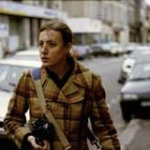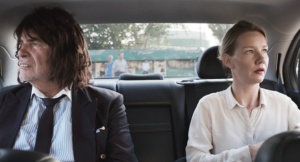by Birgit Winkler
What do you associate with the 9th November of 1989 first? The fact that the Cold War came to an end? Or that – for the first time in history – a conflict of this dimension was settled peacefully?
Either way – the fall of the Berlin Wall had profound cosequences – political and social: not only two states, ideologies and societies – or say rather one of them – fall apart. It had also deep impact on every single person, interrupting lives and careers all of a sudden and therefore leaving people feeling uprooted.
For quite a few this implied starting completely from the scratch, which – of course – wasn’t easy at all! From one day to another everything what one’s life used to be about was vanished. The consequence: not only adopting a new life but a new identity! No wonder there were a lot of people struggeling, asking themselves only this very question: How the hell do I go on in life?
These were such questions by which a few young filmmakers were triggered at that time. They studied film at “Deutsche Film und Fernsehakademie“ (DFFB) in Berlin united by nothing else, but their common interest in film. Instead of relying on the conventional approach to filmmaking they were driven by the idea to create new ways of storytelling. Their names were: Christian Petzold, Angela Schanelec and Thomas Arslan.
In their films they focused on exactly those very people: the one’s struggling in life when facing the aftermath of the German re-unification – especially interested in the people living in the sticks and how their lives were affected. But even when they did not know how to carry on they were constantly seeking new perspectives in life.
Brilliantly drawn attention to in one of Thomas Arslan’s early releases “Geschwister“ (Siblings, 1997) – telling the story about the three siblings Erol, Achmed and Leyla, raised by a Turkish father and a German mother in Berlin-Kreuzberg. The film portrays quite casually their day-to-day life. Unlike Ahmed and Leyla, who feel quite settled in Germany, Erol does not. He and his friends spend their days by roaming the streets of Berlin. The film is about finding his own identity as well as an outline of one’s life. No need to mention that this state of uncertainty Erol and his friends are in, is also a reflection of the political state of Germany shortly after the fall of the Iron Curtain.

A state of uncertainty – a description that also applies to Christian Petzold’s “Gespenster“ (Ghosts, 2005). Petzold himself said about the film in an interview looking back, that for him it was more about the atmosphere conveyed than about the storyline itself. The film is meant to be capturing the sentiments of that very time – sentiments of transition, including hope, false conclusions and continued attempts. “Ghosts“ portrays 24 hours of two girls – Toni and Nina – who meet by chance in Berlin. Even though they have nothing in common, apart from that they are both outsiders, it’s the beginning of an extraordinary friendship.
Christian Petzold already gained reputation for an earlier release: “Die innere Sicherheit“ (The State I am In, 2000) which is about two left-wing terrorists who once went underground and since then have been searched by the police. When their daughter Jaenne rebels more and more against their isolated existence, when falling in love with a boy, she ultimately poses a threat to their security. The film received several awards as well as good reviews.
The films of the “Berlin School“ were not only striking, because of the new stories they told. What they also have in common is their experimental approach to storytelling itself: From the very first beginning they tried out new stylistic devices such as long lasting shots, less edited – quite unprecedented in film so far, but this is exactly what the Berlin directors became famous for.

A prominent example for this experimental approach is – for example – an early work of Angela Schanelec titled “Marseille“, 2004. Instead of introducing the main protagonist by revealing her face in one of the very first shoots, the audience does not see anything else, but a very long overshoulder shoot out of a car’s front window. One can’t help, but following the main character through the streets of Marseille. Visually – this was extraordinary in film history! “Marseille“ became the most conventional success – especially in France the film was very well accepted.
Today the films are known to be those of the “Berlin School“. The directors themselves always denied that there actually exists something like a “Berlin School“, referring to the fact that they are neither united by a political idea nor movement nor a common school of thought, but a passion for film. In fact it were the film critics who had – when thinking of a name for it – ended up with labeling it this way.
However, the films of the “Berlin School” never reached a massive audience. They were mostly cineastes and film students intrigued by the new cinema from Germany in the 1990ies.
Saying that, there are critics, though, putting the lack of mainstream success to the assumption the films of the “Berlin School” might be more taxing to watch.
Another often referred critique is protagonists would often do stay aloof, which would make it difficult for the audience to establish an emotional connection to them, therefore. Staying distant may well have the consequence the films also lack warmth as well as emotions necessary to feel empathy with the protagonists. Dominik Graf – director and professor for film at DFFB at that very time Arslan, Schanelec and Petzold studied at this institution – once put it like this: the so called “Snow White effect“ – saying the protagonists remain behind a kind of glass wall and meaning therefore that they maintain distant.
In the following years – after the turn of the millenium – a second generation of young filmmakers turned up on the screen, following in Arslan’s, Schanelec’s and Petzold’s footsteps.
Directors, regarded as belonging to the second generation are – amongst others – Christoph Hochhäusler, Benjamin Heisenberg, Maren Ade, Valeska Grisebach, Henner Winckler, Ulrich Köhler, Elke Hauk and Sonja Heiss. Hochhäusler and Heisenberg – once both students at the “Hochschule für Film und Fernsehen“ in Munich – are also publisher of “Revolver“: A film magazine, which became a mouthpiece of the discourse about the “Berlin School“, discussing their films in essays.
The new generation of filmmakers focused less on political perspectives – their stories tended to be more personal. Although their protagonists did also struggle in life, but in another way. This time it was more about young people failing, because of too many options available in life. Failing because they were not only lacking role models, but also motivation to create outlines of their lives. So it was no more about the question: How should one go on in life? This time it was more about: In which way we want to live and how do we want to live?
Just like in Maren Ade’s film “Everyone Else“, 2009. The film tells the story about Gitti and Chris – an established couple in their thirties – at least this is what they used to think of themselves until they meet an old friend of Chris’s with his wife during their holidays. A couple, which is living a more conventional relationship.
What is first an encounter by chance becomes a challenge in every way, when they are suddenly getting – more and more – unsecure, facing questions such as: What is our relationship actually about? What kind of role models are we – maybe still – expected to fulfil by society? And last but not least: What kind of relationship do we want to lead?
“Everyone Else“ brought Maren Ade not only a lot of attention for her work as a filmmaker – the film was also awarded at the Berlin film festival in 2009 when – for example – Ade received the silver bear as best director.

Last year she released her latest film project – again a film about a relationship between a man and a woman – but this time between father and daughter. Brilliantly drawn attention to in „Toni Erdmann“. Wilfried – a primary teacher – is facing retirement. His daughter Ines – in her mid-thierties – is about to climb up the career ladder in consulting, often working abroad – as she does for her current job in Bucharest. Since father and daughter have distanced from each other over the years Wilfried is driven by the wish to come closer to his daughter again. Therefore he is turning up in Romania and from then on does not leave his daughter’s side anymore, pretending to be – among other things – her boss’s life coach. In doing so he is coming up with a weird disguise, including a wig and a moustache. And this is not the only thing that is making one laugh out loud!
To cut a long story short: This film about a father trying to reconnect with his grown-up daughter is emotional, melancholic and funny – all at once!
„Toni Erdmann“ already received very good critique when it premiered at the Cannes film festival in 2016. Although it was not awarded, it was celebrated by the international press. Furthermore, it was even nominated for this year’s Oscar awards as best foreign film. It was the very first time a film of the „Berlin School“ was conventionally that successful – also internationally – even so the „Museum of Modern Art“ in New York honoured the Berlin director’s work already with an exhibition in 2013.
However, what does this kind of conventional success ultimately mean? “Berlin School” goes mainstream, finally? Not at all! But it means it might have achieved something, which is extremely rare in arts – namely it might have hit a „zeitgeist“ – also in terms of humour – which german films weren’t associated with in the first place so far.
Anyway, Maren Ade has managed to realise a film, which may well be called a classic some day! And if so – might this imply the end of a subcultural era? Unlikely! As the directors will always maintain their experimental approach to filmmaking, including this very special perspective to life, which is not only characteristic of the films, but will also keep the Berlin filmmakers constantly propelling their work – today and in the future!











Great article!!!